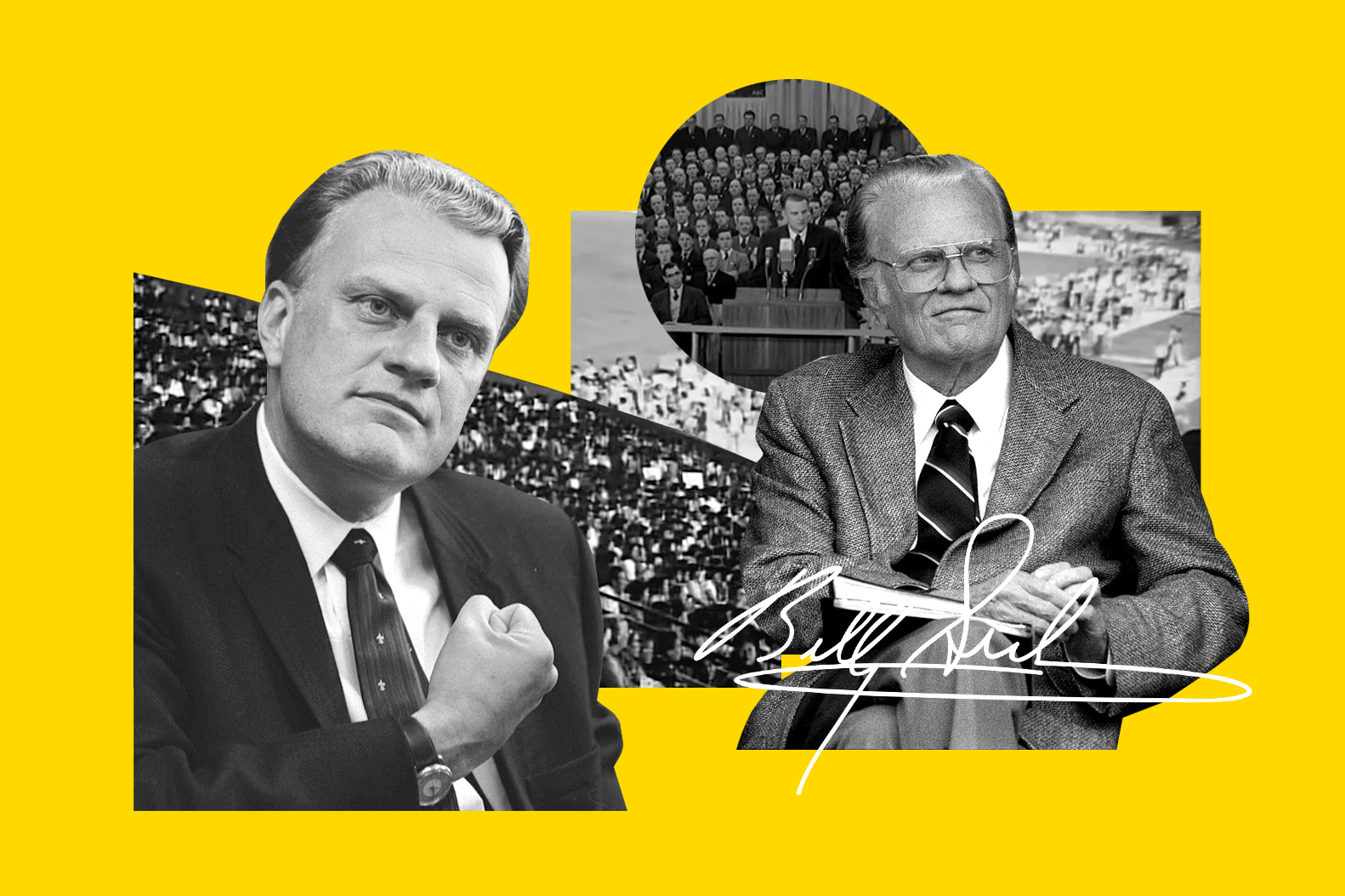Today (Feb 21) marks the fifth anniversary of Billy Graham’s passing.
To the random person, this might seem like a weird date to take special note of. For me, however, it is a very noteworthy day because I wrote my university thesis with Dr Graham as my main subject matter.
My thesis supervisor and mentor gifted me a biography of Dr Graham (which would become the most important resource for my thesis research) and wrote this note accompanying it: “Gerald, hope that you will not only learn ABOUT him but also learn FROM him!”
Indeed, I would discover that there is much we can learn from Dr Graham’s life and legacy. Below are three lessons that I took away from his example.
He spoke Truth to power
There have been countless full-time evangelists throughout the ages, who have done tremendous work to spread the Gospel — none of them have managed to form personal relations with as many “famous people” as Billy Graham has.
This is something that distinguishes him from most other religious public figures.
The best example of this is Dr Graham’s association with twelve consecutive American Presidents, a remarkable record by any measure.
Dr Graham was able to reach out to them with God’s truth by regarding them not as Presidents first and foremost, but as normal people who needed God’s mercy:
- He explained to John F. Kennedy the Second Coming of Jesus Christ.
- He prayed with Lyndon B. Johnson at the White House’s swimming pool.
- He counselled Ronald Reagan on the issue of abortion.
- He chatted with Bill Clinton about the nature of God’s will in the Oval Office.
- He counselled Dwight D. Eisenhower on his deathbed.
- He comforted Richard Nixon in his arms at his mother’s funeral.
All the Presidents he engaged with appreciated his counsel; some have even credited him for making a difference in their lives.

Alongside this, he was also able to forge a lifelong friendship with Queen Elizabeth II — they were able to meet a dozen times.
He also met with many other well-known world leaders, from British Prime Ministers Winston Churchill and Margaret Thatcher to Communist leaders like Mikhail Gorbachev and Kim Il-Sung.
On top of that, he even rubbed shoulders with Hollywood celebrities, such as when he prayed together with Frank Sinatra, interceding together for President Reagan after a near-fatal assassination attempt was made on him.
famous and powerful figures are ultimately people just like us… they need the power of the Gospel every bit as much as the rest of us do.
What can we learn from Graham’s record of associating with and ministering to these public figures?
First off, we should remember that these famous and powerful figures are ultimately people just like us, with their insecurities and weaknesses, and they need the power of the Gospel every bit as much as the rest of us do.
Secondly, Graham managed to stay humble and pure even while often navigating a world of famous and powerful people (more on that later).
Thirdly, it is a good example of how boldness in our faith really pays off. When we not only hold firmly to Jesus, but openly testify of His good news before others, we never know who and how many it will end up impacting.
He had humility and integrity
Even though Dr Graham became well-known and rubbed shoulders with many other powerful people, there was one trait he continued to consistently embody — humility.
When I went through the many archives of interviews and talks that Dr Graham gave in his lifetime, it was almost impossible to find any examples of him bloviating about his own accomplishments or giving off an air of superiority.
He was keenly aware of his own imperfections and sinfulness, and that girded the modesty with which he always carried himself.
He embodied the Christlike ethic that is laid out in Philippians 2 where Jesus, even while possessing equality with God, didn’t use that as reason to exert earthly dominance, but instead humbled Himself even to the point of sacrificing His life on the cross.
It is no wonder that numerous people, like former Presidents Jimmy Carter and Barack Obama, used the word “humble” to describe him in their tributes following his passing.

Another word that describes Dr Graham well? Integrity.
It is a trait that you might think is important especially for spiritual leaders claiming to represent God, or that it would come naturally to them.
Sadly, however, there are many examples throughout church history which show us that many fail in the area of integrity.
However, when you look at Dr Graham, he consistently maintained his sense of integrity.
Privately, by all accounts, he upheld a biblical standard of personal purity throughout his ministry and was faithful to his wife (there is even a “rule” named after him, about not being alone with someone of the opposite gender who is not your spouse).
Dr Graham ministry’s handling of finances stood in stark contrast to the notorious “televangelists” of the 1980s (and beyond).

He also did well to avoid some of the toxic ways in which American Christianity sometimes manifested itself.
He spoke out against the tendency to mix the Christian faith with certain political ideologies, at a time when the “Religious Right” began to emerge as a political force claiming to represent Christian values.
He also avoided the unnecessary judgmentalism and mean-spirited harshness that characterised many religious fundamentalists, by always speaking the truth in love and keeping clear of self-righteousness.
My favourite example of his public integrity? Dr Graham’s insistence on bringing blacks and whites together during his evangelistic “crusade” meetings in the American South during the 1950s.
He did this during a time when the authorities and many American churches upheld the despicable and ungodly practice of enforced racial segregation.
When it must have been tempting to simply go along with the prevailing culture, Dr Graham held on firmly to the truth and saw all people as children created by God in His image, equal before His eyes.
Dr Graham’s example should make us more determined to consistently show integrity in all the things we do, big and small, as well as to maintain a humble attitude, knowing that by doing so we are honouring our Creator.
He served Jesus above all
Ultimately, when you look at the legacy that Dr Graham built during his lifetime of almost an entire century, his was simply a life dedicated to serving God, proclaiming Jesus and building His Kingdom here on earth.
This was a man who preached in 187 different countries, fuelled by the intention of obeying the Great Commission — to make disciples of all nations.
Many around the world believed in Christ through Dr Graham’s preaching, and went on to disciple others in their own countries afterwards.

When Dr Graham came to Singapore in 1978, he played a big role in strengthening the Christian church here. Even today, there are many local believers who can testify how that 1978 Crusade helped to either strengthen or kickstart their faith!
Dr Graham’s life of devotion to building God’s Kingdom was reflected by his unshakeable confidence that he would meet his Saviour after his life here on earth (it was as if his whole life was lived with that goal in mind!).
He once said, “Someday you will hear Billy Graham is dead. Don’t you believe a word of it — I shall be more alive”.
Words spoken by someone who lived for the eternal Kingdom to come rather than the temporal things of this world!
How he’s impacted me
I am happy to say that Billy Graham is one of my biggest heroes of the faith.
He was someone who I admired and looked up to before I started writing my undergraduate thesis, and someone who I appreciated and admired even more once I finished writing my thesis on him.
There are a few specific ways in which his legacy inspires and encourages me.
Firstly, Dr Graham is one of the best examples of someone who dedicates his life to building Christ’s Kingdom here on earth, and by God’s grace is able to accomplish a lot in that regard.
Secondly, his life’s work reminds me of the hope and promise that the Gospel of Jesus Christ is truly something for all peoples and all nations.
Thirdly, his example encourages me that when we maintain our integrity and humility before others and before the Lord, we will be rewarded for it whether that’s in this life and/or the life to come.
To all who have read this, I hope the example of Dr Graham’s life is likewise able to inspire you in fulfilling God’s will, wherever He calls you to!
- Which aspect of Dr Graham’s life stood out to you?
- How might you apply any of these lessons to your life and ministry?
- Pray that God would raise up many more men and women like Dr Graham in service of the Gospel.









